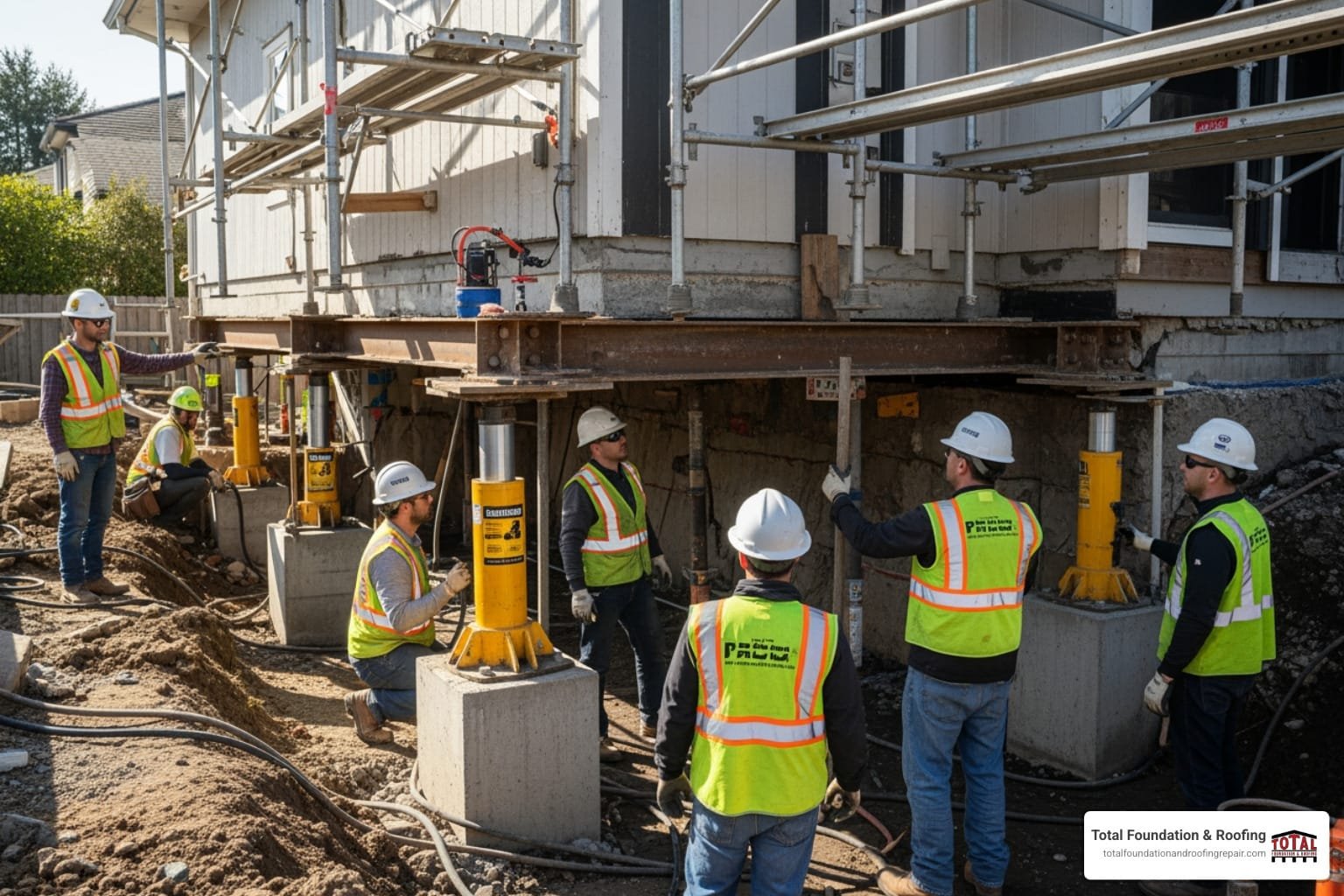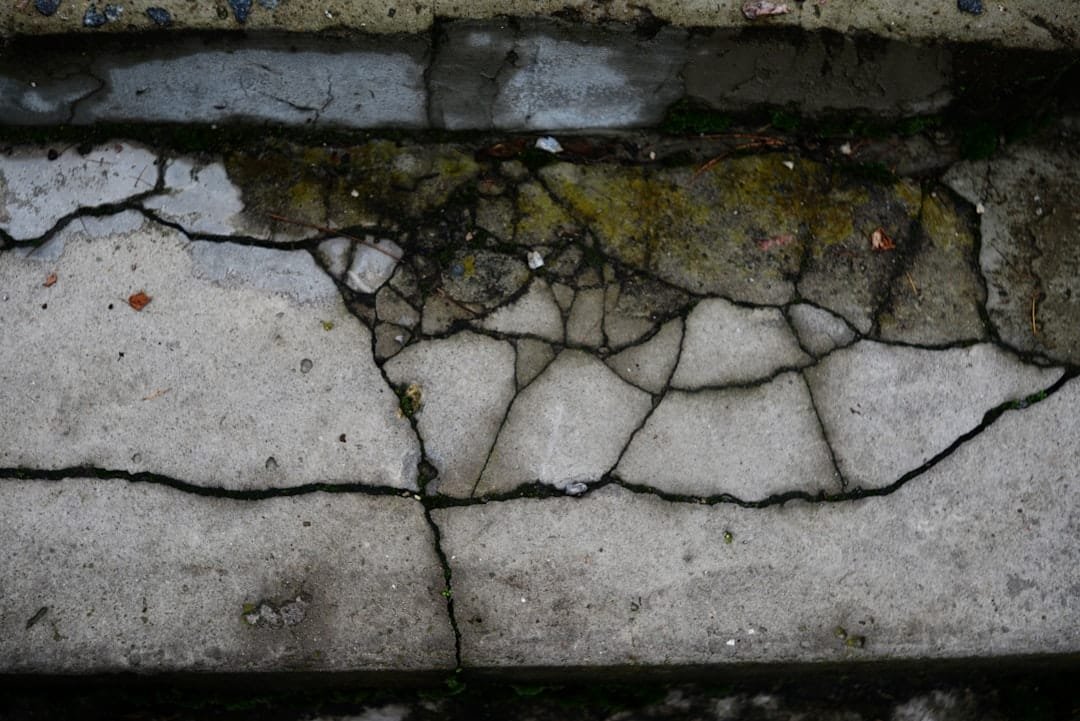Table of Contents
ToggleWhy Foundation Waterproofing Near Me Matters More Than You Think
Foundation waterproofing near me is one of the most searched terms by homeowners facing basement leaks, foundation cracks, or musty odors in their homes. Whether you’re dealing with water intrusion after heavy Texas rains or want to prevent costly damage before it starts, finding the right local contractor can save you thousands in repairs.
Quick Answer: What to Look for in Local Foundation Waterproofing Contractors
- BBB Accreditation – Verify A+ ratings and complaint history
- 25-Year Warranties – Look for transferable guarantees on work
- Licensed & Insured – Confirm proper credentials and coverage
- Local Experience – Choose contractors familiar with Texas soil and climate
- Written Estimates – Get detailed quotes from 3+ contractors
- No High-Pressure Sales – Avoid contractors demanding large upfront deposits
The average cost for basement waterproofing ranges from $600 to $14,000, with most 500-square-foot basements costing between $2,500 and $5,000 to waterproof. Areas with heavy rainfall often see higher costs due to increased contractor demand.
As you wake up to find water seeping through basement walls or notice those telltale musty odors, the urgency becomes real. One homeowner shared how they “excavated and tar-sealed the exterior but still had interior seepage after storms” – highlighting why choosing the right waterproofing method and contractor matters.
About the Author
I’m Daniel Sowell, owner of Total Foundation & Roofing Repair with over 18 years of experience helping Texas Hill Country homeowners with foundation waterproofing near me challenges. Having worked on countless waterproofing projects throughout Kerrville and surrounding areas, I’ve seen how the right contractor and method can protect your home’s value and your family’s health.

What You’ll Learn
In this comprehensive guide, we’ll walk you through finding reliable foundation waterproofing contractors in your area. You’ll find the importance of proper waterproofing, how to spot warning signs, different waterproofing methods, essential hiring tips, and realistic cost expectations for the Texas Hill Country region.
Why Waterproofing Your Foundation Is a Must
Let me paint you a picture that might sound familiar. You’re enjoying a quiet evening at home when you notice that musty smell drifting up from the basement. You head downstairs with a flashlight and find what every homeowner dreads – water stains on the walls and puddles on the floor.
Water intrusion isn’t just about mopping up a mess. It’s like inviting trouble to move in permanently. When water finds its way through your foundation, it starts a domino effect that can turn your biggest investment into your biggest headache.
The real villain here is hydrostatic pressure. Think of it as water’s way of being pushy – literally. When water builds up around your foundation, it creates pressure that forces moisture through even tiny cracks. Over time, this pressure widens those cracks and threatens your home’s structural integrity.
Here in the Texas climate, we get hit with a double whammy. Our intense summer heat bakes the ground like concrete, then sudden storms dump inches of rain in hours. This wet-dry cycle makes our clay soil expand and shrink like a sponge, putting constant stress on foundation walls.
But the structural damage is just the beginning. That moisture creates a five-star resort for mold growth. And trust me, mold is the worst houseguest ever – it never leaves, it ruins everything it touches, and it makes everyone sick. The health risks from mold exposure are serious, especially for kids and older family members who might develop respiratory problems or allergic reactions.
Your home’s resale value takes a beating too. Nothing sends potential buyers running faster than signs of water damage. Even if you do find someone willing to buy, you’ll likely lose thousands of dollars in value.
What Is Foundation Waterproofing?
Foundation waterproofing is like giving your home a good raincoat – but one that works from the ground up. It’s a comprehensive approach that uses multiple barrier systems to keep water where it belongs: outside your house.
The process typically involves several components working together. Drainage systems redirect water away from your foundation before it can cause problems. Sealants fill in cracks and gaps where water might sneak through. Waterproof membranes create an impenetrable shield against moisture.
Modern waterproofing might include exterior membranes applied directly to foundation walls, interior drainage systems with sump pumps, or specialized vapor barriers that prevent moisture from seeping through concrete. The key is creating multiple layers of protection – because when it comes to water, you can never be too careful.
Dangers of Ignoring Moisture
Here’s the thing about foundation moisture – it’s like that small leak in your roof that you keep meaning to fix. Ignore it long enough, and you’ll end up with a much bigger (and more expensive) problem.
Those minor cracks you see today can turn into major structural issues tomorrow. What starts as a $500 repair can quickly become a $5,000 foundation overhaul. Water damage also creates electrical hazards when moisture reaches outlets, switches, or appliances in your basement.
Termite infestation is another unwelcome surprise. These destructive insects are drawn to moisture like moths to a flame. Once they find your damp basement, they’ll set up shop and start munching their way through your home’s wooden structure.
The impact on indoor air quality can’t be ignored either. Scientific research on mold exposure shows that breathing mold spores over time can cause serious respiratory issues, skin irritation, and even neurological symptoms in sensitive people.
When you’re searching for “foundation waterproofing near me,” you’re not just looking for a contractor – you’re looking for peace of mind. Because the cost of prevention is always less than the cost of major repairs down the road.

Spotting the Problem: Signs & Causes of a Leaky Foundation
Your nose often knows first. That persistent musty smell that hits you when you walk into your basement isn’t just unpleasant – it’s your home’s way of telling you there’s a moisture problem brewing. This odor signals mold growth, and mold can’t survive without water, so you know moisture is getting in somewhere.
Next, take a close look at your walls. Cracks are like roadmaps showing where water wants to travel. Those stair-step patterns along mortar joints are particularly telling, as are horizontal cracks that run across foundation walls. Don’t dismiss vertical cracks either – they might seem harmless, but they can channel surprising amounts of water during our Texas downpours.
Efflorescence sounds fancy, but it’s just those white, chalky streaks you see on basement walls. Think of them as evidence that water has been playing hide-and-seek through your concrete, leaving behind mineral deposits when it evaporates.
Pooling water around your foundation is about as subtle as a fire alarm. But also watch for sneakier signs like consistently damp soil or patches where your grass grows differently near the house. These subtle changes often reveal underground moisture issues.
Bowed walls are your foundation’s way of waving a white flag. When hydrostatic pressure builds up, it can actually push your walls inward. This is serious business that needs immediate attention from professionals.
Common Culprits Behind Basement Flooding
Poor grading is the number one troublemaker. If the soil around your home slopes toward your foundation instead of away from it, you’re basically creating a funnel that directs every drop of rainwater straight to your basement walls.
Heavy rainfall can overwhelm even well-designed drainage systems. When we get those intense Texas downpours that dump several inches of rain in just a few hours, inadequate drainage simply can’t keep up. That’s why areas with heavy rainfall often see higher costs for foundation waterproofing near me services – demand goes through the roof when the water starts coming through the floor.
Aging concrete is another common villain. Just like everything else, concrete gets tired over time. Homes that are 20 years or older often need waterproofing updates as their original moisture barriers start showing their age.
Your gutters and downspouts can turn from heroes to villains when they get clogged. Instead of directing water safely away from your home, blocked gutters create concentrated waterfalls that pour directly onto the ground next to your foundation.
Tree roots are nature’s little troublemakers. They’re just looking for water, but in their quest, they can crack foundation walls and mess up your drainage systems. Those beautiful mature trees might be adding curb appeal, but if they’re too close to your home, their expanding root systems can create ongoing moisture headaches.
DIY Inspection Checklist
Grab a flashlight and take a walk through your basement or crawl space. Look for any signs of moisture, water stains, or those telltale white mineral deposits on walls and floors. Pay extra attention to corners and spots where walls meet the floor – these are water’s favorite hiding places.
Try the tin foil test if you suspect a problem area. Tape a piece of aluminum foil to a damp wall and wait 24 hours. If you find moisture on the outside of the foil, you’ve got condensation issues. If moisture shows up between the foil and the wall, water is actually coming through your foundation.
Take an exterior grading walk around your home. The soil should slope away from your foundation – aim for at least 6 inches of drop over the first 10 feet from your house.
Methods & Costs: Choosing the Right Waterproofing Solution
When it comes to foundation waterproofing near me, understanding your options makes all the difference between a quick fix and a lasting solution. Think of waterproofing like choosing between an umbrella and a raincoat – both keep you dry, but one works better in certain situations.
Interior waterproofing is like having a good drainage system inside your home. It manages water that’s already found its way to your foundation, using sump pumps, drainage channels, and vapor barriers to keep your living spaces dry. This approach works well when you’re dealing with minor seepage or want to avoid major excavation around your home.
Exterior waterproofing takes a different approach – it stops water before it ever reaches your foundation walls. This method requires digging around your home’s perimeter, but it’s like building a fortress against water intrusion. The results typically last much longer, though the upfront investment is higher.
Sump pumps are the workhorses of interior systems. These automated guardians sit in your basement, ready to pump out water whenever it accumulates. Modern versions include battery backup systems, so they keep working even when storms knock out your power – exactly when you need them most.
French drains redirect groundwater away from your foundation using perforated pipes surrounded by gravel. Picture them as underground highways that give water a better path to follow instead of pooling around your basement walls. They work both inside and outside your foundation, depending on your specific situation.
Vapor barriers act like invisible shields against moisture creeping through concrete. These specialized membranes are especially important in crawl spaces, where ground moisture can create humidity problems that affect your entire home’s air quality.
Crack injection involves filling foundation cracks with expanding materials that create watertight seals. It’s perfect for smaller cracks but won’t help with major structural damage or cracks that are still moving.
Crawl space encapsulation transforms your crawl space into a controlled environment. By sealing everything with vapor barriers and adding dehumidification systems, you eliminate moisture problems while often improving your home’s energy efficiency.
| Method | Cost Range | Disruption Level | Longevity | Best For |
|---|---|---|---|---|
| Interior Drainage | $2,500-$7,000 | Moderate | 15-25 years | Active leaks, existing basements |
| Exterior Waterproofing | $8,000-$15,000 | High | 25+ years | New construction, major renovations |
| Crack Injection | $300-$800 per crack | Low | 5-10 years | Minor cracks, temporary fixes |
| Crawl Space Encapsulation | $3,000-$8,000 | Moderate | 20+ years | Humidity control, energy efficiency |
Average Price Tags in the Hill Country
Here in the Texas Hill Country, most homeowners with 500-square-foot basements spend between $2,500 and $5,000 for comprehensive waterproofing. After working on countless projects throughout Kerrville, Fredericksburg, and Comfort, I’ve seen how local conditions affect pricing.
The $600 to $14,000 range covers everything from simple crack repairs to complete exterior waterproofing systems. Simple crack injection or interior sealant work falls on the lower end, while full perimeter excavation with membrane installation reaches those higher numbers.
Heavy rainfall in our area often increases contractor demand, especially during late spring and early summer when homeowners find water problems after winter storms. This seasonal demand can affect pricing, so planning ahead often saves money.
Labor rates in smaller Hill Country communities tend to be more reasonable than big city prices, but specialized waterproofing still requires experienced technicians. Quality work costs more upfront but saves thousands in future repairs.

Factors That Change the Quote
Basement size drives costs more than any other factor. A 1,000-square-foot basement typically costs twice as much to waterproof as a 500-square-foot space – simple math based on materials and labor time needed.
Soil type significantly affects your project costs. The clay soil common throughout our region requires special handling and often needs extra drainage capacity. Clay expands and contracts dramatically, putting more stress on waterproofing systems than sandy soils would.
Accessibility challenges can increase labor costs when contractors must work around landscaping, decks, or HVAC equipment. Homes with finished basements need additional work to access foundation walls, adding to the overall project timeline and cost.
Severity of damage determines whether you need simple crack repairs or complete foundation restoration. Multiple cracks, bowed walls, or structural issues require more extensive solutions that naturally cost more.
Your chosen method dramatically affects the final price. Interior drainage systems typically cost less than exterior excavation and membrane installation, but exterior work often provides longer-lasting results that justify the higher investment.
Several financing options can help manage waterproofing costs: home equity loans work well for major projects, while personal loans handle smaller repairs. Many contractors offer financing programs, and you might qualify for insurance claims if the damage happened suddenly. Energy efficiency rebates sometimes apply to crawl space encapsulation projects that improve your home’s overall efficiency.
Finding “Foundation Waterproofing Near Me”: Vetting Local Contractors
When you’re searching for “foundation waterproofing near me”, you’re not just looking for any contractor – you’re looking for someone who’ll protect your biggest investment. The difference between a great contractor and a questionable one can mean thousands of dollars and years of headaches.
BBB accreditation tells you a lot about how a company treats its customers. Look for that A+ rating, but don’t stop there. Dig into their complaint history to see how they handle problems when things go wrong.
Your contractor needs proper licenses and insurance – this isn’t optional. Texas requires specific licensing for foundation work, and working with unlicensed contractors can void your insurance coverage if something goes wrong. Don’t just take their word for it either. Ask to see certificates and verify coverage directly with their insurance company.
Online reviews give you the real story from actual customers. Skip the generic five-star reviews that just say “great work!” and focus on detailed reviews that describe specific problems and solutions. Look for patterns in complaints – does the same issue come up repeatedly?
The best contractors understand local building codes and Hill Country conditions inside and out. They know how our clay soil behaves, what drainage solutions work best, and how to steer local permit processes without delays.
Warranties separate the pros from the pretenders. Look for companies offering 25-year warranties on their work – that’s a contractor who stands behind what they do. Even better if those warranties are transferable to new homeowners, adding value to your property.
Red Flags When Hiring for foundation waterproofing near me
Some warning signs are so obvious they practically wave themselves. High-pressure sales tactics top the list – any contractor who insists you sign today or lose their “special price” is probably someone you want to avoid. Quality work and fair pricing don’t need artificial urgency.
Watch out for contractors demanding large upfront deposits. Legitimate companies typically ask for minimal money upfront and tie payments to project milestones. If they need a big chunk of cash before they start, that often signals cash flow problems or worse.
Vague project descriptions make it impossible to know what you’re actually paying for. Professional estimates spell out exactly what materials they’ll use, how they’ll do the work, and when they’ll finish.
Any contractor who won’t provide a written warranty is telling you they don’t expect their work to last. Don’t accept verbal promises or handshake deals when it comes to foundation work.
Questions to Ask Before Signing a Deal for foundation waterproofing near me
Smart questions help you separate the wheat from the chaff. Start with timeline questions – when will they start, how long will it take, and what happens if weather delays the work? Unrealistic timelines often indicate inexperience or overpromising.
Ask about specific materials they’ll use. You want product names and manufacturer warranties, not generic descriptions like “waterproof coating.” The materials they choose directly affect how long your waterproofing will last.
Warranty details matter more than warranty length. What exactly is covered? What’s excluded? How do you file a claim if problems arise? Make sure you understand these details before signing anything.
Don’t skip asking for references from recent customers. More importantly, actually call those references and ask about their experience. How was the work quality? Did the crew clean up properly? Would they hire this contractor again?
For more information about our specific approach to crack repair, you can learn more at our crack repair services page.
Trust-Building Extras
The best contractors go beyond basic requirements to build real trust with their customers. Twenty-five year warranties show genuine confidence in both their workmanship and the materials they use. When a contractor is willing to guarantee their work for a quarter-century, they’re clearly not planning to disappear next year.
Transferable guarantees add real value to your home. If you sell before your warranty expires, the new owners get the same protection you did. This feature often helps homes sell faster and for better prices.
Some contractors offer maintenance plans that include annual inspections and preventive care. These programs help catch small problems before they become expensive repairs, extending the life of your waterproofing investment.
The Better Business Bureau offers excellent guidance on hiring waterproofing contractors and avoiding common pitfalls that trip up homeowners.

Frequently Asked Questions About Local Waterproofing
When you’re searching for foundation waterproofing near me, you probably have questions about what to expect. Let me answer the most common concerns I hear from homeowners in the Hill Country.
How long will the job take?
The honest answer? It depends on what your home needs. Interior drainage systems usually take us 2-5 days to complete, while exterior waterproofing projects can stretch to 1-2 weeks depending on how much excavation we need to do.
Weather plays a huge role in our timeline, especially for exterior work. We can’t install membranes properly when it’s raining, and extreme Texas heat affects how materials cure. That’s why I always build weather delays into our schedules.
Can I DIY waterproofing safely?
I get this question a lot, and I understand the temptation to save money. But waterproofing isn’t like painting a room or fixing a leaky faucet. The skill level required goes way beyond typical DIY projects.
You need to understand soil conditions, drainage principles, and how different materials work together. One mistake can redirect water toward your neighbor’s property or create bigger problems than you started with.
The tool requirements alone make DIY challenging. You’ll need excavation equipment, specialized application tools, and safety gear that most folks don’t have lying around. By the time you rent everything, you’ve often spent more than you’d save on labor.
Here’s the risk analysis that keeps me up at night: failed DIY waterproofing usually means we have to tear everything out and start over. That turns a $5,000 project into a $10,000 project real fast.
What maintenance is needed afterward?
Once we’ve waterproofed your foundation, you’re not completely hands-off, but the maintenance is pretty straightforward.
Gutter cleaning becomes even more important now. Those clean gutters help protect your investment by keeping water flowing away from your foundation instead of overwhelming your new drainage system.
Sump pump testing should happen twice a year – once before spring rains and again before winter. Just pour some water into the sump pit and make sure everything kicks on properly. If you have a battery backup (which I highly recommend), test that too and replace the battery every 3-5 years.
Annual inspections are your best insurance policy. After heavy rains, take a walk around your house and look for any water pooling where it shouldn’t be. Inside, keep an eye out for new cracks, stains, or that telltale musty smell that might indicate problems.
Conclusion
When you’re searching for foundation waterproofing near me, this decision affects more than just your basement – it protects your family’s health, your home’s value, and your peace of mind. The musty odors, wall cracks, and water pooling we’ve discussed aren’t just minor inconveniences. They’re warning signs that demand action before small problems become expensive disasters.
The investment in quality waterproofing work pays dividends for years to come. While that $2,500 to $5,000 price tag might seem steep, compare it to the cost of structural repairs, mold remediation, or the thousands you’d lose in home value from water damage. Professional foundation waterproofing isn’t an expense – it’s insurance for your most valuable asset.
At Total Foundation & Roofing, we’ve spent over 18 years learning exactly how Texas Hill Country conditions affect your foundation. Our certified technicians understand why the clay soil around Kerrville expands and contracts so dramatically, how our intense storms create hydrostatic pressure, and which waterproofing methods work best in our unique environment.
We’ve seen too many homeowners try DIY fixes or hire the cheapest contractor, only to call us months later when their “solution” failed. That’s why we offer 25-year warranties on our foundation work – we stand behind every job because we know our methods work. Our transferable guarantees even add value if you decide to sell your home.
Whether you’re dealing with minor seepage in Fredericksburg, major flooding in Comfort, or just want to prevent problems before they start, we provide honest assessments and realistic solutions. No high-pressure sales tactics, no inflated quotes – just straightforward advice from neighbors who understand your situation.
Don’t let foundation moisture problems steal another night’s sleep. The longer you wait, the more expensive repairs become, and the greater the risk to your family’s health from mold exposure.
For detailed information about our comprehensive foundation waterproofing services, visit our website or give us a call. We serve the entire Texas Hill Country region and provide free estimates that help you understand your options without any obligation.
Ready to protect your home and family? Request your free estimate today. Let’s work together to keep your basement dry and your foundation strong for decades to come.




